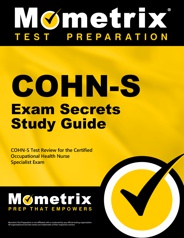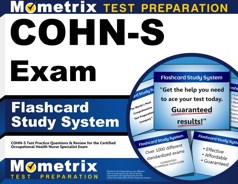The American Board for Occupational Health Nurses, Inc. (ABOHN) administers the Certified Occupational Health Nurse Specialist (COHN-S) examination, which is given to nursing candidates who wish to be qualified as occupational health nurses. The exam showcases the candidate’s skills and knowledge in the proper nursing applications needed as an occupational health nurse.
Click “Start Test” above to take a free COHN-S practice test, and check out our premium-quality COHN-S test prep resources by clicking the links below!
Exam Eligibility
There are a few requirements that must be met to be eligible to take the COHN-S exam. You must have:
- An RN license that is current and not restricted
- 3,000 hours of occupational health nursing work experience gained within the five years before applying for the COHN-S examination
- A bachelor’s degree or higher (it does not have to be a nursing degree)
An alternative to the work-hours requirement is obtaining 2,000 hours in a baccalaureate or graduate degree program that is related to occupational health and is completed in the five years before applying to take the examination.
Check Out Mometrix's COHN-S Study Guide
Get practice questions, video tutorials, and detailed study lessons
Get Your Study Guide
COHN-S Exam Outline
There are a total of 160 multiple-choice questions on the examination, 25 of which are unscored pre-test questions. You will have 3 hours to complete all 160 questions.
The 25 pre-test questions are considered to be experimental questions and have never been used on an exam before. You will not know which of the questions are included in the experimental questions.
The test material also uses the Occupational Health Nurse’s four process steps or methods used in the care of a patient that must be applied.
- Assessment is the process of collecting data, verifying the data, and communicating the data gathered to the patient in a way that they understand.
- Planning involves the process of establishing the desired outcome for the patient by designing strategies that will achieve those outcomes upon completion.
- Implementation is the process of initiating the correct nursing actions to accomplish a specific outcome.
- Evaluation is the process of measuring the way a patient responds to treatments, including medications they are taking and other nursing actions.
Exam Contents
The contents of the exam cover OHN roles as they pertain to the following four major categories:
Clinical Practice (20 scored questions)
- Work-related injuries and illnesses
- Non-work-related injuries and illnesses
- Nursing standards of care
- Nurse practice laws and regulations
- Clinical care counseling and education
- Infection control standards of care protocols
- Cultural competence and considerations
- Medical documentation
Case Management (25 scored questions)
- Fit for duty
- Case management counselling and education
- Disability case management
- Workers compensation
- Return to work
- Restricted/modified duties and accommodations
- Referrals and resources
- Third-party providers and services evaluation and management
2. Risk and Compliance (32 scored questions)
Risk Management and Prevention (20 scored questions)
- Worker, worker population, and workplace settings assessments
- Worker job requirements
- Ergonomics and work design
- Environmental health and industrial hygiene
- Disaster panning and emerging health issues
- Hierarchy of controls
- Job analysis and descriptions
Compliance (12 scored questions)
- Ethical, legal, and regulatory compliance
- Occupational health surveillance programs
- Drug and alcohol programs
3. Program Management and Quality Assurance (30 scored questions)
Program Management (15 scored questions)
- Health, safety, and workplace education and training programs
- Worker/Employee assistance programs
- Wellness and health promotion programs
- Stakeholder education and collaboration
Quality Assurance (15 scored questions)
- Surveillance/Regulatory compliance testing programs
- Quality management and improvement programs
- Program evaluation and quality care metrics
- Audits
4. Operations and Business Management (28 scored questions)
Operations Management (15 scored questions)
- Scope of services for occupational health staff
- Occupational health and safety program development and implementation
- Staff competencies, requirements, and protocols
- Hiring, training, supervising, and retaining staff
- Strategic planning
Business Acumen (13 scored questions)
- Stakeholder engagement and education
- Budgets, cost containment, cost avoidance, and ROI
- Analysis of outcomes and metrics
- Communication of reports to stakeholders
Registration
To register for the exam, visit the ABOHN website.
You will be requested to provide the supporting documents listed below once the submission of your application is complete. The supporting documents can be faxed to 630-789-8901 or sent via email to info@abohn.org.
Supporting Documents
- Your RN license. On the license, your current name just like you put on the application must be present. The expiration date of the license must be visible and the name of the agency that issued the license must be visible.
- Previous employment information. If you are using past employment to prove your experience, you must have a job description for each place of employment with contact information, length of employment, duties performed and position held.
- Confirmation of your degree. A diploma is preferred, but you can use a final transcript from the college or educational institution if your diploma is not available.
Exam Fees
The application fee is $150, which is non-refundable. The COHN certification exam fee is $400. This fee must be paid in full within 90 days of receiving the invoice from ABOHN and is good for a period of 120 days.
If you cannot take your examination within 120 days of paying your examination fee, you can apply for an extension, which costs $50. If approved, the extension will be for 60 days. You can only apply for an extension one time.
Scheduling Your COHN-S Exam
You must schedule an examination appointment with PSI. This can be done online or by calling PSI at 888-519-9901.
If you call to schedule your appointment before 3:00 pm, you will probably be able to take the test within the next two days. The tests are given Monday through Saturday.
| If you call before 3:00 pm CT | You may be scheduled as early as |
|---|---|
| Monday | Wednesday |
| Tuesday | Thursday |
| Wednesday | Friday/Saturday |
| Thursday | Monday |
| Friday | Tuesday |
You will be allowed to select from several different testing centers. Make note of how far away your chosen testing center is from your home; you should plan to leave early so you are at the testing center at least 30 minutes before the test is scheduled to begin. This will give you enough time to find your seat, store your items in the locker provided for you, and go to the restroom before testing begins.
Rescheduling
PSI does allow you to reschedule one time at no extra charge as long as you reschedule at least 2 business days before your schedule to test.
| If exam is scheduled for | ABOHN must be notified of your plans to reschedule by 3:00 pm the previous |
|---|---|
| Monday | Wednesday |
| Tuesday | Thursday |
| Wednesday | Friday |
| Thursday | Monday |
| Friday | Tuesday |
Check Out Mometrix's COHN-S Flashcards
Get complex subjects broken down into easily understandable concepts
Get Your Flashcards
Test Day
What to Bring
Two forms of valid ID are the only things you need to worry about bringing to the testing center.
One of these must be a government-issued photo ID. This could be a driver’s license, passport, military identification card, alien registration card, or state identification card.
The other identification must have your name and signature. Examples of second identifications that will be accepted are a credit card, a social security card with your signature, an employee identification card, and a school identification card.
What NOT to Bring
- Cell phone (if you have a cell phone and it rings or makes noise during the test, you will be asked to leave and there will be no refund of your examination fees)
- Tablets, smartwatches, or other electronic devices
- Heavy coats
- Purses or bookbags (if you bring them, they will be stored in your locker until the test is complete)
- Scratch paper (you will be given 5 sheets of scratch paper by the test proctor)
- Hats
- Watches
- Food or drink
- Hooded clothing
- Shawls
- Good-luck items
- Reference materials
- Reading materials
Misconduct
If you are found guilty of any of the following, you will be asked to leave and your examination fees will not be refunded.
- Creating a disturbance
- Being uncooperative with the proctor
- Using abusive language
- Giving help to another test-taker or accepting help from another test-taker
- Attempting to smuggle in any of the forbidden personal belongings
- Leaving the test center during the examination
- Talking with one of the other test-takers
- Attempting to take the examination for someone else
- Attempting to make records of the examination questions
COHN-S Scores
The passing score does vary, but generally, you will need to get 71% of the questions correct to earn a passing score for the examination. That means you need to answer at least 96 questions correctly.
If you do not know an answer, you are allowed to skip the question and come back to it at the end of the test. If an answer is left blank, that question is considered to be answered incorrectly.
Receiving Your Score
The score you earn will be mailed to you within 8 to 12 weeks following the examination. Scores will NOT be reported in any way other than a written examination delivered by mail.
Retaking the Exam
If you do not pass the exam on your first attempt, you can apply to retake the examination as soon as you would like.
How to Study
How to Study Effectively
Your success on COHN-S test day depends not only on how many hours you put into preparing but also on whether you prepared the right way. It’s good to check along the way to see whether your studying is paying off. One of the most effective ways to do this is by taking COHN-S practice tests to evaluate your progress. Practice tests are useful because they show exactly where you need to improve. Every time you take a free COHN-S exam practice test, pay special attention to these three groups of questions:
- The questions you got wrong
- The ones you had to guess on, even if you guessed right
- The ones you found difficult or slow to work through
This will show you exactly what your weak areas are and where you need to devote more study time. Ask yourself why each of these questions gave you trouble. Was it because you didn’t understand the material? Was it because you didn’t remember the vocabulary? Do you need more repetitions on this type of question to build speed and confidence? Dig into those questions and figure out how you can strengthen your weak areas as you go back to review the material.
Answer Explanations
Additionally, many COHN-S practice tests have a section explaining the answer choices. It can be tempting to read the explanation and think that you now have a good understanding of the concept. However, an explanation likely only covers part of the question’s broader context. Even if the explanation makes sense, go back and investigate every concept related to the question until you’re positive you have a thorough understanding.
Comprehend Each Topic
As you go along, keep in mind that the COHN-S practice test is just that: practice. Memorizing these questions and answers will not be very helpful on the actual test because it is unlikely to have any of the same exact questions. If you only know the right answers to the sample questions, you won’t be prepared for the real thing. Study the concepts until you understand them fully, and then you’ll be able to answer any question that shows up on the test.
Strategy for COHN-S Practice
When you’re ready to start taking practice tests, follow this strategy:
- Remove Limitations. Take the first test with no time constraints and with your notes and COHN-S study guide handy. Take your time and focus on applying the strategies you’ve learned.
- Time Yourself. Take the second practice test “open book” as well, but set a timer and practice pacing yourself to finish in time.
- Simulate Test Day. Take any other practice tests as if it were test day. Set a timer and put away your study materials. Sit at a table or desk in a quiet room, imagine yourself at the testing center, and answer questions as quickly and accurately as possible.
- Keep Practicing. Keep taking practice tests on a regular basis until you run out of practice tests or it’s time for the actual test. Your mind will be ready for the schedule and stress of test day, and you’ll be able to focus on recalling the material you’ve learned.
FAQs
Q
How many questions are on the exam?
A
There are 160 multiple-choice questions on the COHN-S exam, 25 of which do not count toward your final score.
Q
How long is the exam?
A
The time limit for the COHN-S exam is 3 hours.
Q
What type of questions are on the exam?
A
All of the questions on the COHN-S exam are multiple-choice.
Q
How much does the exam cost?
A
The COHN-S exam fee is $400. This must be paid in addition to the application fee of $150.
Q
What is a passing score on the COHN-S exam?
A
A passing score on the COHN-S exam varies, but correctly answering at least 71% of the questions is recommended.
Q
When will I receive my scores?
A
Scores for the COHN-S are mailed to you within 8-12 weeks after completing the exam.
Q
What is an occupational health nurse?
A
An occupational health nurse (OHN) provides for and delivers health and safety programs and services to the community, or workers in a specific workplace. These nurses address work-related and environmental hazards, often working with employers and their employees to identify risks and help maintain a healthy working environment.
